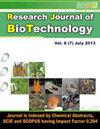The repurposing of FDA-approved drugs to stop viral replication in COVID-19 treatment: a comprehensive molecular docking and dynamics analysis
IF 0.2
Q4 BIOTECHNOLOGY & APPLIED MICROBIOLOGY
引用次数: 0
Abstract
Amidst a public health crisis such as the SARS-CoV-2 induced COVID-19 pandemic, the urgency to develop and provide access to novel drugs becomes paramount. In these scenarios, repurposing existing drugs emerges as an appealing strategy due to their established safety profiles and prior regulatory approvals, potentially streamlining their adoption for new therapeutic purposes. There has been a notable interest in investigating the repurposing potential of FDA-approved drugs to combat the disease triggered by the SARS-CoV-2 virus. This investigation was conducted with the objective of identifying FDA-approved antiviral drugs that could target both the original and mutant forms of the SARS-CoV-2 RNA-dependent RNA polymerase (RdRp) protein, given the escalating prevalence of SARS-CoV-2 mutations that undermined vaccine efficacy and underscored the need for alternative treatment avenues. Despite ongoing clinical trials, the selection of drugs specifically designed to combat SARS-CoV-2 remains limited. The present study aimed to assess the inhibitory potential of eight approved antiviral drugs. The wild-type and mutant (P323L) RdRp protein (PDB ID: 7BV2). By utilizing molecular docking techniques, the selected drugs were evaluated based on their binding affinities with both the mutant and wild-type RdRp protein. Subsequently, the protein-ligand complexes exhibiting the highest binding affinities were subjected to a 150 ns molecular dynamics simulation to evaluate their stability. The outcomes of the molecular docking analysis pinpointed Dolutegravir and Beclabuvir as possessing the most robust binding affinities for both mutant and wild-type RdRp systems. These findings prompted the selection of these drugs for an in-depth molecular dynamic simulation (MDS) investigation. The comprehensive analysis of Root Mean Square Deviation (RMSD), Root Mean Square Fluctuation (RMSF), Radius of Gyration (Rg), Solvent Accessible Surface Area (SASA) and Secondary Structure Dynamics confirmed that Dolutegravir and Beclabuvir are potent inhibitors of the NSP12 protein. Collectively, the computational assessments put forth two potential contenders: Dolutegravir and Beclabuvir as promising inhibitors against both the wild-type and mutant RdRp proteins. To further validate these drug candidates, rigorous in vitro and in vivo investigations are warranted which could eventually position them as valuable therapeutic agents in the fight against COVID-19.在 COVID-19 治疗中重新利用 FDA 批准的药物阻止病毒复制:分子对接和动力学综合分析
在 SARS-CoV-2 引发的 COVID-19 大流行等公共卫生危机中,开发和提供新型药物的紧迫性变得至关重要。在这种情况下,重新利用现有药物成为一种有吸引力的策略,因为这些药物具有公认的安全性,并已获得监管部门的批准,有可能简化将其用于新治疗目的的程序。人们对研究美国食品及药物管理局(FDA)批准的药物在抗击 SARS-CoV-2 病毒引发的疾病方面的再利用潜力产生了显著的兴趣。鉴于 SARS-CoV-2 基因突变的发生率不断上升,削弱了疫苗的疗效,并突出了对替代治疗途径的需求,这项调查的目的是确定 FDA 批准的抗病毒药物,这些药物可以针对 SARS-CoV-2 RNA 依赖性 RNA 聚合酶(RdRp)蛋白的原始形式和突变形式。尽管目前正在进行临床试验,但专门用于抗击 SARS-CoV-2 的药物选择仍然有限。本研究旨在评估八种已获批准的抗病毒药物的抑制潜力。野生型和突变型(P323L)RdRp 蛋白(PDB ID:7BV2)。利用分子对接技术,根据药物与突变型和野生型 RdRp 蛋白的结合亲和力对所选药物进行了评估。随后,对表现出最高结合亲和力的蛋白质配体复合物进行了 150 ns 的分子动力学模拟,以评估其稳定性。分子对接分析的结果表明,Dolutegravir 和 Beclabuvir 与突变型和野生型 RdRp 系统的结合亲和力最强。这些发现促使我们选择这两种药物进行深入的分子动态模拟(MDS)研究。对均方根偏差(RMSD)、均方根波动(RMSF)、回旋半径(Rg)、溶剂可及表面积(SASA)和二级结构动力学的综合分析证实,多鲁特韦和贝拉布韦是 NSP12 蛋白的强效抑制剂。总之,计算评估提出了两个潜在的竞争者:Dolutegravir和Beclabuvir有望成为野生型和突变型RdRp蛋白的抑制剂。为了进一步验证这些候选药物,有必要进行严格的体外和体内研究,最终使它们成为抗击 COVID-19 的重要治疗药物。
本文章由计算机程序翻译,如有差异,请以英文原文为准。
求助全文
约1分钟内获得全文
求助全文
来源期刊

Research Journal of Biotechnology
BIOTECHNOLOGY & APPLIED MICROBIOLOGY-
CiteScore
0.60
自引率
0.00%
发文量
192
期刊介绍:
We invite you to contribute Research Papers / Short Communications / Review Papers:
-In any field of Biotechnology, Biochemistry, Microbiology and Industrial Microbiology, Soil Technology, Agriculture Biotechnology.
-in any field related to Food Biotechnology, Nutrition Biotechnology, Genetic Engineering and Commercial Biotechnology.
-in any field of Biotechnology related to Drugs and Pharmaceutical products for human beings, animals and plants.
-in any field related to Environmental Biotechnolgy, Waste Treatment of Liquids, Soilds and Gases; Sustainability.
-in inter-realted field of Chemical Sciences, Biological Sciences, Environmental Sciences and Life Sciences.
-in any field related to Biotechnological Engineering, Industrial Biotechnology and Instrumentation.
-in any field related to Nano-technology.
-in any field related to Plant Biotechnology.
 求助内容:
求助内容: 应助结果提醒方式:
应助结果提醒方式:


